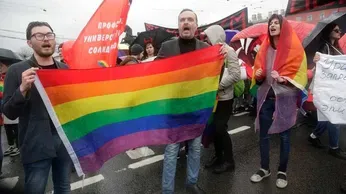
Apr 1
As Russia's Anti-Gay Crackdown Intensifies, A Prison Death, Worsening Persecution, and Defiance Follow
Kilian Melloy READ TIME: 3 MIN.
Russia's anti-gay crackdown has far outstripped the 2013 "propaganda" law that criminalized acknowledgement of, and open support for, LGBTQ+ people and their rights.
Perhaps inevitably, the country's homophobic trajectory has resulted in at least one prison death: a travel operator accused of organizing travel to Russia for gay men.
Andrei Kotov's "travel agency offered tours aimed solely at men," The New York Times detailed, "and that was enough to attract the attention of the police enforcing new Russian laws that restrict the rights of gay people."
Kotov himself described a nightmarish scene in which, he said, "Fifteen people came to my place at night," tied him up, and started "beating me in the face, kicking me and leaving bruises."
"Mr. Kotov said the officers pressured him to 'confess' that he was running a travel agency aimed at gay people, which he denied," the Times detailed. "The officers kept beating him, he said, and told him: 'No trips for gays.'"
Just a few weeks later, Kotov – still in prison – was dead, and officials were claiming it was an act of suicide.
Since the advent of the 2013 "propaganda" law, Russia's oppression has followed a predictable (and brutal) path. What started as a law purporting to "protect" minors has metastasized into laws that make it a crime simply to argue that same-sex relationships fall into the normal range of human romantic bonds or to advocate for LGBTQ+ people even where no minors are present.
Russia has reportedly gone so far as to coordinate with security forces in Chechnya, where LGBTQ+ people have reportedly been abducted, tortured, and murdered.
The situation has worsened since Russia's invasion of Ukraine, a military venture that was expected to result in a quick victory, but which has now dragged on for more than three years.
"Any public representation of gay and transgender people is banned," the Associated Press noted last December. "Gender-affirming medical care and changing one's gender in official documents are prohibited."
The Times article added that "gay rights activists, their lawyers or others involved in efforts to support L.G.B.T.Q. people could face jail sentences of six to 10 years."
In late 2023, Russia's Supreme Court declared the queer rights movement itself to be a "terrorist" organization.
"Just days after the Supreme Court ruling, the LGBTQ+ community was rattled by news of police raiding gay bars, nightclubs and venues that hosted drag shows in Moscow, St. Petersburg and other cities," the AP recounted.
"Last spring, the first criminal case on charges of involvement with the 'LGBT movement' extremist group was lodged against the owner and the staff of a bar in the southwestern city of Orenburg that held drag performances," the AP added. "A handful of similar cases came elsewhere."
That is just the tip of the iceberg. "At least 12 criminal inquiries on the L.G.B.T.Q. extremism charges were initiated last year, according to the Russian prisoner rights advocacy group OVD-Info," the Times noted.
Kotov's prison death remains a watershed moment.
"It was utterly unclear to him how arranging trips for men can be considered setting up an extremist group," his mother told the press, the Times relayed.
The state has found plenty of willing collaborators in the persecution of LGBTQ+ people, and social media – always a reliable means to disseminate disinformation – has become part of the equation. "In the remote eastern Siberian city of Yakutia, Pryany Yakutsk, a popular media channel on Telegram, raised alarm over the holidays about 'debauchery and corruption of men happening under the very nose of law enforcement and the officials in Yakutsk,'" the Times documented.
The channel's assertions came complete with "grainy photos" purporting to be "from a nightclub party depicting what appeared to be bare-breasted women, one of them on a naked man," as well as the claim that "the party featured what it called 'transvestite performers' from Thailand."
Added the Times: "Russian Community, a nationalist group that styles itself as social vigilantes, has also posted photos and videos from police raids."
In spite of worsening conditions and a stream of queer people leaving the country, some remain defiant.
"I somehow have managed to adapt," a trans woman named Anna told the AP. "I know how to live here."
"Yulia, another transgender woman, also vowed to stay," the AP story added, "describing it as sort of a mission to show that 'people like me are not necessarily weak, are not necessarily useless.'"
A young man named Tahir, 25, told the Times: "I definitely know that things will get worse. But I don't want to leave. This country is mine as much as it is for others."
Kilian Melloy serves as EDGE Media Network's Associate Arts Editor and Staff Contributor. His professional memberships include the National Lesbian & Gay Journalists Association, the Boston Online Film Critics Association, The Gay and Lesbian Entertainment Critics Association, and the Boston Theater Critics Association's Elliot Norton Awards Committee.







